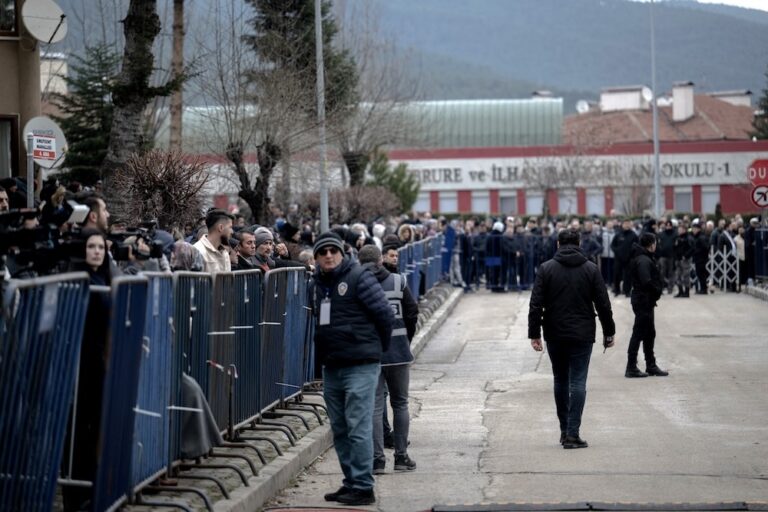(BIANET/IFEX) – The following is a 3 May BIANET report: Media Report: A Sober Press Freedom Day In the first three months of the year, four new cases arising from article 301 of the Penal Code were launched while journalists mourned the loss of their colleague, Turkish-Armenian journalist Hrant Dink. Rising nationalist sentiments also translated […]
(BIANET/IFEX) – The following is a 3 May BIANET report:
Media Report: A Sober Press Freedom Day
In the first three months of the year, four new cases arising from article 301 of the Penal Code were launched while journalists mourned the loss of their colleague, Turkish-Armenian journalist Hrant Dink. Rising nationalist sentiments also translated into restrictions on activists.
The BIA Media Monitoring Desk has released the 2007 1st Quarterly Media Monitoring Report, which covers the months of January, February and March.
This year, the Turkish media celebrate World Press Freedom Day on May 3, grieving and protesting the brutal murder of their colleague Hrant Dink, the Turkish-Armenian journalist who was murdered on 19 January after being targeted in a series of trials under the infamous article 301 of the Turkish Penal Code.
The quarterly report discloses that 12 new cases have been launched against journalists and activists. Media Monitoring Desk’s 2006 annual report listed 293 people as having been subjected to freedom of expression cases that year.
Four new Article 301 cases
During the first quarter of 2007, Ethem Açikalin from Turkey’s Human Rights Association Mersin branch and pro-Kurdish “Özgür Gündem” daily reporters Irfan Uçar, Sinan Kara and Umut Horzatli have been tried under Article 301. The government is turning a blind eye to their cases.
The growing list of trials under Article 301, which denotes crimes such as “insulting Turkishness”, since the adoption of the new Turkish Penal Code just 22 months ago, has affected more than a hundred activists and journalists.
18 attacks and eight threats in three months
Following Hrant Dink’s murder, numerous journalists, activists and websites have been targeted with threats from nationalist circles and groups. Prof. Baskin Oran, Prof. Ibrahim Kaboglu, journalists Can Dündar, Aziz Özer and Necati Abay, singer Ferhat Tunç, and activists Eren Keskin and Özgür Radio have all received death threats via e-mail.
During the first quarter of 2007, nine media outlets, including two websites, have been attacked. In 2006, 26 journalists and two media outlets were attacked, while seven journalists were threatened.
Three more blamed for “instigating people to hatred”
“Milliyet” editors Tahir Özyurtseven and Cem Dizdar, along with writer Tarhan Erdem, are alleged to have been “instigating hatred on the part of the people” according to Article 216 of the Penal Code, following a series of articles titled “Who are we?” based on a public survey that revealed the ethnic, religious and other affiliations of the Turkish people. The same article was also the subject of 35 cases in 2006.
Two new “Ataturk” cases
Allegations of “insulting Ataturk”, the founder of modern Turkish republic, have also increased. Prof. Atilla Yayla and translator Atilla Tuygan are on trial defending accusations to this effect.
In 2006, four writers and journalists were acquitted in cases related to this law; publisher Ahmet Önal is still on trial.
Judiciary hard on the Kurdish issue
The Turkish judiciary has also increased pressure on pro-Kurdish publications. In March, “Ülkede Özgür Gündem”, “Azadiya Welat”, “Güncel” and “Yasamda Gündem” newspapers were temporarily shut down, for between 15 days to one month under the Prevention of Terror Law.
Discretion for “news sources” just on paper
In the south-eastern city of Sirnak, the public prosecutor’s office ordered a raid on the offices of the local Dogan News Agency, confiscating tapes from reporter Emin Bal, thus violating the journalist’s right to not reveal his/her sources.
“Terrorist propaganda” cases continue
The prosecution refuses to reveal the charges against Özgür Radyo programmer Füsun Erdogan and “Atilim” newspaper editor Ibrahim Çiçek, who were taken into custody during a police operation targeting the illegal Marxist Leninist Communist Party (MLKP) seven months ago. The recent changes in the Prevention of Terror Law and the Criminal Code give the prosecution the ability to keep such information from the public.
University student Mehmet Emin Demir, who stated, “I’m Kurdish. The PKK [a Pro-Kurdish guerilla group] is a result, not a cause,” on a TV programme, has been sentenced to 20 months in prison for spreading “propaganda for the terrorist organization”.
Furthermore, journalists Sinan Kara and Mustafa Koyuncu have been arrested on grounds of “defamation via press.” They face damages under European Law.
Disproportionate action against cyber crimes
The Turkish courts ruled in favour of banning access to whole websites for several controversial statements, which was greatly disproportionate to the comments made on them.
Turkish internet users’ access to the video sharing portal YouTube was also temporarily blocked under court orders, following a video allegedly insulting Ataturk. Several other websites such as http://www.8sutun.com and http://www.alinteri.net were also blocked on different grounds.
The Antalya public prosecutor office’s decision to seize the 22 March edition of the “Hurriyet Akdeniz” newspaper before it was circulated met with protests from journalists’ associations who deemed the action to be unlawful.
And there is good news . . .
The 9th criminal chamber of the Supreme Court of Appeals rejected the charges against journalists Zihni Erdem of “Radikal” daily and Derya Sazak of “Milliyet” daily, as well as leader of the main opposition People’s Republican Party (CHP), Hasan Çatalkurt, and MP, Esat Canan, that were brought against them by the Ministry of Justice. The courts deemed that the armed forces had provoked the parties in question.
In accordance with a declining number of applications, the European Court of Human Rights (ECHR) fined Turkey 18,000 YTL (approx. 10,000 euros) in contrast to the amount ruled in 2006, which was 398,000 YTL (approx. 200,000 euros).


